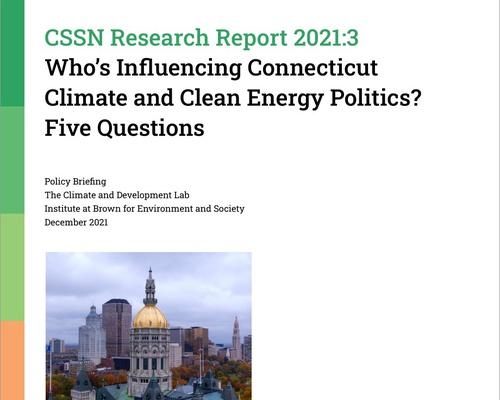Media Contact: Timmons Roberts
timmons@brown.edu; 401-441-2103
NEW REPORT ILLUSTRATES PATTERNS OF PRO-FOSSIL FUEL INFLUENCE ON CLIMATE AND ENERGY ISSUES IN CONNECTICUT
Electric and Gas Utilities Lead Opposition to Climate Solutions by Outspending Climate Advocates as much as 8-1 on Lobbying
PROVIDENCE — December 8, 2021 — After a year defined by increasingly dire climate disasters, urgent calls for action nationally and locally, and the collapse of the regional Transportation Climate Initiative (TCI), a new analysis authored by scholars at the Institute at Brown for Environment and Society provides insights about who is influencing action and inaction on environmental and clean energy policy in the Connecticut State House.
The analysis showed that electric and gas utilities spent $24 million on lobbying between 2013-2020, amounting to four times that of renewable energy firms ($6 million) and more than eight times that of environmental organizations ($2.7 million). The majority of positions taken in written testimony given by the electric/gas utility, heating oil, business association, auto, fossil fuel, and real estate sectors opposed priority climate legislation.
Specific opposition to priority climate legislation most often came from the utility AVANGRID/UIL, the CT Business and Industry Association, the Connecticut Petroleum Council, and Eversource. Among that group, Eversource spent the most on lobbying between 2013-2020, with a total of $6.7 million and an average of $1.6 million per session. The CT Business and Industry Association was not far behind, spending $4.5 million on lobbying between 2013-2020.
The report is based on systematic collection and analysis of 2,940 pieces of testimony on climate legislation, and found that of those, over 91% were supportive. The report also reviewed 263 opposition testimonies to better understand the core messaging being employed against climate solutions.
The report underscores a strategic shift in anti-climate messaging, veering away from attacks on climate science, and towards unsubstantiated arguments attacking the cost and reliability of renewable energy, as well as perceived interference in the market that gives renewables an unfair advantage and projecting an image that is “anti-business”.
“As the climate crisis continues to escalate and the need to accelerate the transition away from fossil fuels becomes more urgent by the day, it is more critical than ever that we understand the forces that slow or halt climate action in state legislatures across the country,” said Timmons Roberts, Ittleson Professor of Environmental Studies and Sociology at Brown University and Executive Director of the Climate Social Science Network that released the report. “While Connecticut made laudable early strides to respond to the threat of climate change over a decade ago, recent years have seen frustrating challenges as critically important bills die in committee and funds intended for clean energy are diverted to other budget shortfalls. This report shines a spotlight on the pressure that fossil fuel companies, utilities, and trade groups are exerting in Hartford to hinder needed climate solutions.”
In light of its findings, the report includes a number of recommendations for the legislature and proponents of climate legislation to consider going forward, including:
- Evaluating and addressing the oversized political influence of utilities
- Identifying opportunities to broaden climate coalitions to help advance policy and blunt pro-fossil fuel attacks
- Confronting anti-climate solution messaging on cost, reliability, and business atmosphere
- Improving transparency, accountability, and opportunities for public voice in the legislature and its committee process
The full report is available for download here.
About the Climate Social Science Network: CSSN is an international network of social science scholars focused on understanding the cultural and institutional dynamics of the political conflict over climate change. CSSN was launched in October, 2020, and is headquartered at the Institute at Brown for Environment and Society. See https://cssn.org
About the Institute at Brown for Science and Society: IBES supports research to understand the interactions between natural, human and social systems. Our teaching programs prepare future leaders to envision and build a just and sustainable world. Visit https://ibes.brown.edu
###



